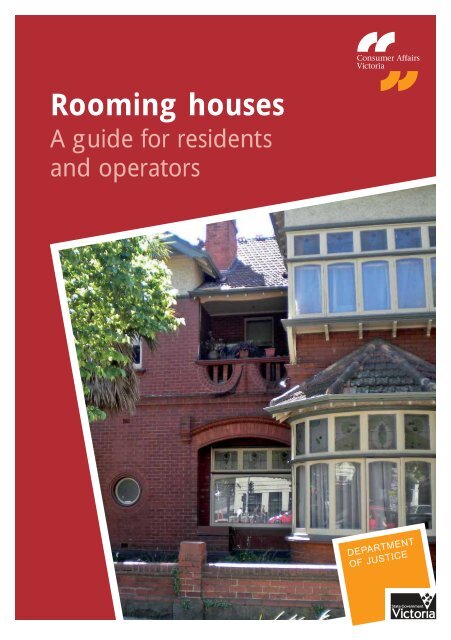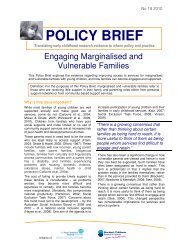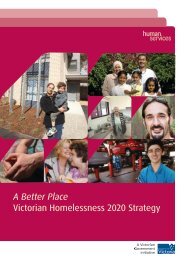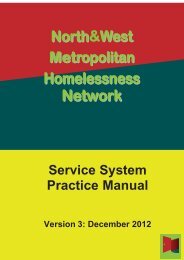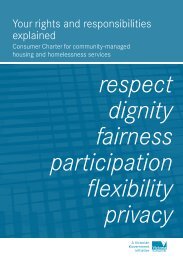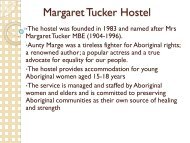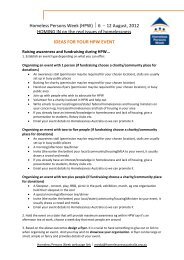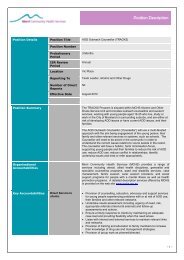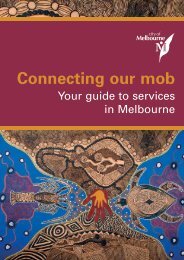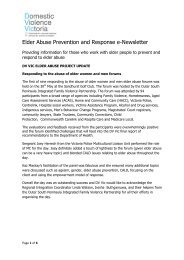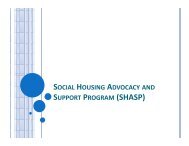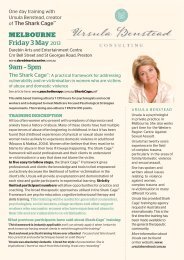Rooming houses: a guide for residents and operators - NWHN
Rooming houses: a guide for residents and operators - NWHN
Rooming houses: a guide for residents and operators - NWHN
- No tags were found...
You also want an ePaper? Increase the reach of your titles
YUMPU automatically turns print PDFs into web optimized ePapers that Google loves.
<strong>Rooming</strong> <strong>houses</strong>A <strong>guide</strong> <strong>for</strong> <strong>residents</strong><strong>and</strong> <strong>operators</strong>
<strong>Rooming</strong> <strong>houses</strong>: A <strong>guide</strong> <strong>for</strong><strong>residents</strong> <strong>and</strong> <strong>operators</strong>DisclaimerBecause this publication avoids the use of legal language, in<strong>for</strong>mation about the lawmay have been expressed in general statements. This <strong>guide</strong> should not be relied uponas a substitute <strong>for</strong> the relevant legislation or professional legal advice.© Copyright State of Victoria 2011No part may be reproduced by any process except in accordance with the provisionsof the Copyright Act 1968. For advice on how to reproduce any material from thispublication contact Consumer Affairs Victoria.Published by Consumer Affairs VictoriaDepartment of Justice121 Exhibition Street Melbourne Victoria 3000Printed by Kosdown Printing63-69 Rouse Street Port Melbourne Victoria 3207ISBN: 1 921079 34 7ii
<strong>Rooming</strong> <strong>houses</strong>A <strong>guide</strong> <strong>for</strong> <strong>residents</strong> <strong>and</strong> <strong>operators</strong><strong>Rooming</strong> house <strong>operators</strong> must give acopy of this <strong>guide</strong> to every resident on orbe<strong>for</strong>e the day they move in.1
<strong>Rooming</strong> <strong>houses</strong>: A <strong>guide</strong> <strong>for</strong><strong>residents</strong> <strong>and</strong> <strong>operators</strong>Telephone interpreting service2
ContentsSection 1: <strong>Rooming</strong> house basics 5About this <strong>guide</strong> 5Who are <strong>residents</strong> <strong>and</strong> <strong>operators</strong>? 5What is a rooming house? 6Registering a rooming house 6When can an operator use abuilding as a rooming house? 7Section 2: Minimum st<strong>and</strong>ards inrooming <strong>houses</strong> 9What are minimum st<strong>and</strong>ards? 9Building safety st<strong>and</strong>ards 9Health <strong>and</strong> hygiene st<strong>and</strong>ards 11Inspections 12Section 3: When a resident moves in 15What must an operator givea resident? 15Charging a bond 16‘Condition Report’ 17Section 5: When a resident is leaving 29When a resident wants to leave 29When an operator asksa resident to leave 30How is notice given? 32Can a resident be <strong>for</strong>ced to leave? 33Section 6: After a resident has left 37Repaying the bond 37Goods left behind 38Section 7: Solving disputes 41Using VCAT 41Useful contacts 43Checklist <strong>for</strong> <strong>operators</strong> 46Checklist <strong>for</strong> <strong>residents</strong> 48Section 4: During a resident’s stay 19Rent 19Adding more <strong>residents</strong> to a room 21Applying <strong>for</strong> a rental assessment 22Repairs <strong>and</strong> maintenance 22Who pays utility bills? 24Entry rights 25If someone breaks the rules 263
Section 1<strong>Rooming</strong> house basics
This <strong>guide</strong> is <strong>for</strong> rooming house <strong>residents</strong> <strong>and</strong> <strong>operators</strong>.Operators must give a copy of this <strong>guide</strong> to every new resident.About this <strong>guide</strong>This <strong>guide</strong> explains what <strong>residents</strong> <strong>and</strong><strong>operators</strong> must do to follow Victoria’srooming house laws.Penalties <strong>for</strong> not complying with theselaws apply.Who are <strong>residents</strong> <strong>and</strong> <strong>operators</strong>?A resident is a person who rents a roomin a rooming house as their only or mainresidence. A resident does not need tohave a tenancy agreement to live in arooming house.This <strong>guide</strong> is not a legaldocument or substitute<strong>for</strong> professionallegal advice.Note: If a person hasa valid tenancyagreement, they area tenant under thelaw, <strong>and</strong> not a resident. This isimportant, as it affects things suchas notice periods that a residentor operator must give. For morein<strong>for</strong>mation, contact ConsumerAffairs Victoria:E consumer@justice.vic.gov.auT 1300 55 81 81In this <strong>guide</strong>, a rooming house operatorcan refer to:• the owner of the building• a person who has leased a building <strong>and</strong>is operating it as a rooming house• an agent or head tenant employed bythe owner.5
<strong>Rooming</strong> <strong>houses</strong>: A <strong>guide</strong> <strong>for</strong><strong>residents</strong> <strong>and</strong> <strong>operators</strong>What is a rooming house?Under the Residential Tenancies Act 1997,a rooming house is a building where:• one or more rooms is available <strong>for</strong>rent, <strong>and</strong>• the total number of people who mayoccupy those rooms is four or more.The Minister <strong>for</strong> Housing can also declarea property as a rooming house.Also, in most rooming <strong>houses</strong>:• <strong>residents</strong> share bathrooms, kitchens,laundries <strong>and</strong> other common areas• the owner <strong>and</strong> their family generallydo not live on the premises• separate rental agreements may exist<strong>for</strong> different <strong>residents</strong>.Registering a rooming houseUnder the Public Health <strong>and</strong> WellbeingAct 2008, <strong>operators</strong> must register theirrooming <strong>houses</strong> with the local council ifthey intend to rent out one or more roomsto four or more people.Contact details <strong>for</strong> localcouncils are online atlocalgovernment.vic.gov.au,in the local telephonedirectory or at local libraries.If a person is unsure ifthey are living in, oroperating, a roominghouse, they shouldcontact their local council orConsumer Affairs Victoria.6
When can an operator use abuilding as a rooming house?For an operator to use a property as arooming house, the property must be inan area where the local council allows this.The operator must also:• register with the local council• get the necessary building or otherpermits that may be required• meet the minimum health, building<strong>and</strong> fire safety st<strong>and</strong>ards.Planning controlsEach municipality has a local planningscheme, which controls how l<strong>and</strong> is used.Operators must check with their localcouncil’s planning section to find out if:• the building is located in an area whereuse as a rooming house is permitted• a planning permit is required.Changing the use of the buildingto a rooming houseIf an operator changes the use of theirbuilding into a rooming house, the buildingmust meet the relevant requirements of theBuilding Regulations 2006.This involves the operator arrangingworks such as:• installing the necessary firesafety measures• changing door hardware• installing sanitary facilities• other works.Operators must find out if a building permitis required <strong>for</strong> any building work to changethe use of the building to a rooming house.A council municipal building surveyor(MBS), private building surveyor (PBS)or other suitably experienced buildingprofessional can give advice.For more in<strong>for</strong>mation,<strong>operators</strong> should contactthe building departmentof their local council.Sometimes, an MBS, PBS or other qualifiedbuilding professional may find that nobuilding work is required <strong>for</strong> the newuse as a rooming house.7
Section 2Minimum st<strong>and</strong>ards in rooming <strong>houses</strong>
<strong>Rooming</strong> house <strong>operators</strong> must meet minimum health,wellbeing <strong>and</strong> fire safety st<strong>and</strong>ards. Residents have a rightto be safe <strong>and</strong> secure in their accommodation.What are minimum st<strong>and</strong>ards?Operators must ensure their propertiesmeet minimum st<strong>and</strong>ards.Minimum st<strong>and</strong>ards <strong>for</strong> rooming <strong>houses</strong>are set out in the:• Residential Tenancies Act 1997• Building Regulations 2006• Part 5 of the Public Health <strong>and</strong>Wellbeing Regulations 2009(Prescribed Accommodation).New minimum st<strong>and</strong>ards may beintroduced in the future so it is important<strong>for</strong> <strong>operators</strong> to keep up with the law.Operators can viewthe laws mentionedin this <strong>guide</strong> atlegislation.vic.gov.au.Building safety st<strong>and</strong>ardsThe essential safety measures <strong>for</strong> rooming<strong>houses</strong> are set out in the BuildingRegulations 2006. An operator must ensurethere is no danger to the safety of <strong>residents</strong>or anybody else using the building.Operators must install <strong>and</strong> maintainessential safety systems <strong>and</strong> services<strong>for</strong> an existing building. They must alsokeep documentation, including recordsof maintenance, <strong>and</strong> complete annualessential safety measures reports.The maintenance of essential safetymeasures is:• set out in Part 12 of the BuildingRegulations• listed on the occupancy permit(if one is required).Essential safety measures may also bedetermined by an MBS or PBS followingbuilding work where an occupancypermit is not required.The MBS or PBS will be able to tell<strong>operators</strong> what essential safety measuresthey need to install <strong>and</strong> maintain.9
<strong>Rooming</strong> <strong>houses</strong>: A <strong>guide</strong> <strong>for</strong><strong>residents</strong> <strong>and</strong> <strong>operators</strong>How does the sizeof the roominghouse affect anoperator’s obligations?The Building Regulationsdistinguish between smallrooming <strong>houses</strong> (referred to asClass 1b) <strong>and</strong> large rooming<strong>houses</strong> (Class 3). The life <strong>and</strong> firesafety st<strong>and</strong>ards an operator mustimplement may differ dependingon the size of the rooming house.Operators should contact theirlocal council to find out more.Table 1 (below) shows the differencebetween small <strong>and</strong> large rooming <strong>houses</strong>.Table 1:Small roominghouse (Class 1b)Up to 12 unrelated<strong>residents</strong>Total floor areaof not more than300m 2Large roominghouse (Class 3)13 or moreunrelated<strong>residents</strong>Total floor areamore than 300m 2Some exceptions to the above apply,so <strong>operators</strong> should contact their localcouncil <strong>for</strong> details.Fire safetyOperators must have adequate <strong>and</strong> wellmaintainedhard-wired smoke alarms toprotect <strong>residents</strong>.An MBS or a PBS can tell <strong>operators</strong> the fire<strong>and</strong> life safety systems they have to install.The Building Regulations require some<strong>operators</strong> to install an automatic firesprinkler system to any buildingsconstructed (or <strong>for</strong> which a buildingpermit was issued) be<strong>for</strong>e 1 July 2003.Other fire-related measures <strong>operators</strong> mayneed to install <strong>and</strong> maintain include:• appropriate means of escape, such asclear pathways to exits• fire-fighting services <strong>and</strong> equipment,such as portable fire extinguishers,hose reels <strong>and</strong> hydrants• fire alarms <strong>and</strong> sprinkler systems• bushfire protection measures <strong>for</strong>relevant properties.Other specific fire <strong>and</strong>life safety measuresmay also be required,<strong>and</strong> these will dependon the rooming house’s size <strong>and</strong>other components. Local councilscan give more in<strong>for</strong>mation.10
Signs <strong>and</strong> lightingOperators must install <strong>and</strong> maintainappropriate signs <strong>and</strong> lighting.These may include:• signs warning against the use of liftsin the event of a fire• emergency lighting• artificial lighting to help <strong>residents</strong>escape in an emergency.Health <strong>and</strong> hygiene st<strong>and</strong>ardsAs well as keeping the building safe,<strong>operators</strong> must also maintain minimumst<strong>and</strong>ards of health <strong>and</strong> hygiene. These areset out in Part 5 of the Public Health <strong>and</strong>Wellbeing Regulations 2009 (PrescribedAccommodation).Space requirements in rooming <strong>houses</strong>There are slightly different rules <strong>for</strong>how much floor space is required perresident <strong>and</strong> per room <strong>for</strong> stays of fewer<strong>and</strong> greater than 31 days, as outlined inTable 2a <strong>and</strong> 2b. These laws help ensurethat <strong>residents</strong> have enough space <strong>and</strong>that the rooming house does notbecome overcrowded.Table 2a: Space requirements <strong>for</strong> staysof 31 days or lessTable 2a:Size ofbedroom7.5m 2 to less 2than 10m 210m 2 ormoreMaximum numberof occupants3(add an extra 2m 2 <strong>for</strong>each additional person)Table 2b: Space requirements <strong>for</strong> staysof 32 days or moreTable 2b:Size ofbedroom7.5m 2 to less 1than 12m 212m 2 or more 2Maximum numberof occupants(add an extra 4m 2 <strong>for</strong>each additional person)Important: If a roomis less than 7.5m 2 ,it cannot be used asa bedroom.11
<strong>Rooming</strong> <strong>houses</strong>: A <strong>guide</strong> <strong>for</strong><strong>residents</strong> <strong>and</strong> <strong>operators</strong>Conditions in the rooming houseAll rooming <strong>houses</strong> must have:• at least one toilet, one bath/shower <strong>and</strong>one wash basin <strong>for</strong> every 10 people• bedrooms, toilets, bathrooms,laundries, kitchens, living areas <strong>and</strong> anycommunal areas in good working order,<strong>and</strong> in a clean <strong>and</strong> hygienic condition• a continuous <strong>and</strong> adequate supply ofhot <strong>and</strong> cold water• drinking water fit <strong>for</strong> humanconsumption• the bed linen changed weekly(if supplied), when the bed isvacated <strong>and</strong> be<strong>for</strong>e its re-use byanother resident• sewage <strong>and</strong> water discharged toa sewerage system or to anotherapproved effluent treatment ordisposal system• vermin-proof bins that arecleaned regularly• regular rubbish bin collection.Keeping a registerOperators must keep a register of every<strong>and</strong> resident <strong>for</strong> at least 12 months afterthe resident last lived there. The registermust include the resident’s name <strong>and</strong> futureaddress, <strong>and</strong> arrival <strong>and</strong> departure dates.Advertising the rooming houseIf an operator advertises their roominghouse (<strong>for</strong> instance, in a newspaper oronline), they must advertise it as arooming house, <strong>and</strong> not any other typeof accommodation.InspectionsA rooming house will initially beinspected by an authorised officerfrom the local council.Other inspections may then take place <strong>for</strong>health, building safety or other reasons,<strong>and</strong> may happen r<strong>and</strong>omly or in responseto a complaint.Consumer Affairs Victoria may inspecta rooming house to:• in<strong>for</strong>m <strong>operators</strong> <strong>and</strong> <strong>residents</strong> oftheir rights <strong>and</strong> responsibilities• ensure that if a resident has paid a bond,it has been lodged with the ResidentialTenancies Bond Authority.A building inspection may be conducted by:• an MBS from the local council• a PBS appointed by the roominghouse operator.A building fire safety inspection may alsobe conducted by the Metropolitan FireBrigade or Country Fire Authority.12
The inspector may look <strong>for</strong> things such as:• the general state of repair• ventilation• fire hazards• the prominent display of essentialhealth, building <strong>and</strong> fire safety measures• fire prevention systems, includingsmoke detectors• emergency lighting <strong>and</strong> exits• any other matters that may risk thelife, safety or health of anyone usingthe building.Operators must keep records ofmaintenance of essential safetymeasures <strong>and</strong> the current essentialsafety measures report, as these arelikely to be requested during an inspection.Operators face penalties if they do notkeep adequate records.An MBS or PBS may issue an operatorwith a building notice or building order ifthey believe the rooming house does notcomply with the Building Regulations <strong>and</strong>is there<strong>for</strong>e unsafe.For in<strong>for</strong>mationabout notices <strong>and</strong>orders that may beissued by an MBS orPBS, <strong>operators</strong> shouldcontact the building departmentof their local council.A health inspection by an environmentalhealth officer from the local council orDepartment of Health will look at thingssuch as:• the register of <strong>residents</strong>• the number of bathrooms• general hygiene• room size• rubbish collection• pest control• adequate supply of hot <strong>and</strong> cold water.An inspection may result in an operatorbeing given a written order or notice tocarry out work.13
Section 3When a resident moves in
Operators must give new <strong>residents</strong> certain <strong>for</strong>ms <strong>and</strong> publicationswhen they start living at the rooming house.What must an operator givea resident?1. This <strong>guide</strong>An operator must give a copy of <strong>Rooming</strong><strong>houses</strong>: A <strong>guide</strong> <strong>for</strong> <strong>residents</strong> <strong>and</strong> <strong>operators</strong> toevery new resident, either be<strong>for</strong>e or on theday they move in. However, if a person hasentered into a valid tenancy agreement,they are then a tenant, <strong>and</strong> must be givena copy of Renting a home: A <strong>guide</strong> <strong>for</strong>tenants instead.Copies of this <strong>guide</strong><strong>and</strong> Renting a home:A <strong>guide</strong> <strong>for</strong> tenantsare available fromConsumer Affairs Victoria.A 113 Exhibition Street,Melbourne 3000W consumer.vic.gov.au/rentingT 1300 55 81 812. Contact detailsThese include the operator’s full name,address <strong>and</strong> an emergency telephonenumber (an operator must also let<strong>residents</strong> know of any changes to theircontact details within seven days).If the operator employs an agent, then<strong>residents</strong> must be given the agent’s fullname <strong>and</strong> address.3. Written statement outlining theresident’s main rights <strong>and</strong> dutiesThis statement must be displayed in everyresident’s room <strong>and</strong> given to an occupantno later than the day they agree to startliving at the rooming house. Copies of thisstatement are also available from ConsumerAffairs Victoria <strong>and</strong> the Tenants Union ofVictoria. See page 45 <strong>for</strong> contact details.4. House rulesAn operator may choose to have a set ofhouse rules, which describe the rules the<strong>residents</strong> must follow. The house rulesusually include things such as:• respecting other <strong>residents</strong>’ right topeace <strong>and</strong> quiet• not damaging any property oracting violently• keeping rooms clean• not using rooms <strong>for</strong> illegal purposes.15
<strong>Rooming</strong> <strong>houses</strong>: A <strong>guide</strong> <strong>for</strong><strong>residents</strong> <strong>and</strong> <strong>operators</strong>Residents must be given a copy of thehouse rules on or be<strong>for</strong>e the day they agreeto move in, <strong>and</strong> they must be prominentlydisplayed in each resident’s room.If an operator wants to make changesto the house rules, they must notify theresident in writing at least seven daysbe<strong>for</strong>e the changes come into effect.If a resident believesany of the house rulesare unreasonable,they may apply tothe Victorian Civil <strong>and</strong>Administrative Tribunal (VCAT) tohear the matter. VCAT may orderthe operator to change or removethat rule. For more in<strong>for</strong>mationabout VCAT, see page 41.5. ‘Notice to Proposed <strong>Rooming</strong> HouseResident’ <strong>for</strong>mThis <strong>for</strong>m explains to a resident if they havean exclusive right to their room, or if theymay be sharing it with others. This <strong>for</strong>m isavailable from Consumer Affairs Victoria.6. A notice outlining the costs of anyextra services the operator providesThis may include things such as roomcleaning, linen or meals. If a resident usesthese extra services, the operator mustprovide them with an itemised accountdetailing their use.Charging a bondAn operator may ask a resident to pay abond be<strong>for</strong>e the resident starts living atthe rooming house, but it cannot be morethan the equivalent of 14 days’ rent.If an operator takes a bond, they mustgive the resident a completed <strong>and</strong> signed‘Bond Lodgement’ <strong>for</strong>m <strong>for</strong> them to sign.Once this is done, the resident must begiven a copy.The operator must then send the <strong>for</strong>mto the Residential Tenancies Bond Authority(RTBA) with the bond money within10 business days.The RTBA will hold onto the bondduring the time a resident lives in therooming house.RTBA <strong>for</strong>ms can begenerated atrentalbonds.vic.gov.auor printed <strong>for</strong>ms can beprovided by the RTBA:W rtba.vic.gov.auT 1300 137 164Bonds from the Director of HousingIf a resident is on a low income <strong>and</strong> canaf<strong>for</strong>d to rent privately, but is strugglingto pay the up-front costs, they may beeligible <strong>for</strong> a bond loan from the Directorof Housing (DoH).16
A ‘Bond Lodgement’ <strong>for</strong>m, especiallydesigned <strong>for</strong> the DoH, must be used whenthe DoH contributes all or part of the bond.The DoH will issue the <strong>for</strong>m with the bondpayment when a bond loan is approved.If a resident also contributes to the bond,a separate ‘Bond Lodgement’ <strong>for</strong>m mustbe completed <strong>and</strong> sent to the RTBAwithin 10 business days.Residents should contact the DoH throughthe Office of Housing (see page 44 <strong>for</strong>contact details) to find out if they are eligible.Difference between bond <strong>and</strong> rentThe bond <strong>and</strong> rent are separate payments.A resident must not use any part of thebond as rent.‘Condition Report’If an operator charges a bond from aresident, they must complete a ‘ConditionReport’ with the resident.Consumer AffairsVictoria provides‘Condition Report’<strong>for</strong>ms.The ‘Condition Report’ is important becauseit will be used as evidence if there is a futuredispute about who should pay <strong>for</strong> anycleaning, damage or replacement of missingitems. It can also help decide how a bondshould be repaid at the end of a residency.An operator must give the resident twocompleted <strong>and</strong> signed copies of the‘Condition Report’. The resident thenhas the right to:• check <strong>and</strong> add comments to the‘Condition Report’• state whether they agree with whatthe operator has written.Once the resident is happy with the‘Condition Report’, they must sign <strong>and</strong> giveone copy back to the operator within threedays of moving into the rooming house.The resident should keep the other copy untilthe end of their time at the rooming house.Even if there is nobond, ConsumerAffairs Victoriarecommends the useof a ‘Condition Report’.This <strong>for</strong>m allows the resident <strong>and</strong> operatorto record the room’s condition <strong>and</strong> writedown any damage be<strong>for</strong>e the residentmoves in.17
Section 4During a resident’s stay
Residents <strong>and</strong> <strong>operators</strong> have legal obligations regarding rent,entering a room, issuing notices <strong>and</strong> other matters. Some ofthese obligations will differ if an occupant has entered into a validtenancy agreement. In such cases, the occupant is not a residentbut a tenant. An operator’s legal obligations regarding tenants arecovered in Renting a home: A <strong>guide</strong> <strong>for</strong> tenants.RentIn most cases, a resident will have to paytheir rent in advance. An operator cannotask <strong>for</strong> more than 14 days’ rent in advance<strong>and</strong> they face penalties if they do.A resident must pay their rent <strong>and</strong> continueto pay it when it is due.If a resident does not pay rent by thedue date, the operator may give thema ‘Breach of Duty’ notice <strong>for</strong> not payingtheir rent on time. If the rent is seven ormore days behind, the operator can thengive the resident a minimum two-day‘Notice to Vacate’.Operators must notkeep a resident’s goodsor documents to coverany rent owed. Thisincludes items such aspassports, licences <strong>and</strong> other<strong>for</strong>ms of personal identification.If an operator tries to keep anyof these things, <strong>residents</strong> shouldimmediately contact ConsumerAffairs Victoria:A 113 Exhibition Street,Melbourne 3000E consumer@justice.vic.gov.auT 1300 55 81 81Receipts <strong>for</strong> rentAn operator, agent or any other personwho accepts payment must give theresident a receipt:• immediately, if the resident paysin person• within five business days, if theresident does not pay in person but asks<strong>for</strong> a receipt.19
<strong>Rooming</strong> <strong>houses</strong>: A <strong>guide</strong> <strong>for</strong><strong>residents</strong> <strong>and</strong> <strong>operators</strong>The rent receipt must include:• the operator’s name <strong>and</strong> signature• the resident’s name• the address of the rooming house• the date of payment• the name of the resident makingthe payment• the period the payment covers• how much was paid• a statement that it is a receipt <strong>for</strong> rent.If a resident has not paid their rent inperson <strong>and</strong> has not requested a receipt,they have up to 12 months after they paidto ask <strong>for</strong> a receipt.Operators must keep records of all rentsthey receive <strong>for</strong> at least 12 months.Changing the rent amountAn operator can increase the rent onlyonce in any six-month period, <strong>and</strong> mustgive the resident at least 60 days’ writtennotice telling them of this increase.However, an operator <strong>and</strong> resident mayagree to an increase without this notice ifa resident requests extra services, such asbed linen or meals. This agreement mustbe in writing <strong>and</strong> signed by both parties.If an operator provides these servicestemporarily, they must lower the rentagain once they stop providing them.The operator <strong>and</strong> resident should agreeon the new rent amount. However, if theycannot agree, either party may apply tothe Victorian Civil <strong>and</strong> AdministrativeTribunal (VCAT) to hear the matter <strong>and</strong>make a ruling.Operators must advise<strong>residents</strong> of any rentincrease using a valid‘Notice of Rent Increaseto Resident/s of <strong>Rooming</strong> House’<strong>for</strong>m, available from ConsumerAffairs Victoria:A 113 Exhibition Street,Melbourne 3000W consumer.vic.gov.au/rentingT 1300 55 81 8120
Adding more <strong>residents</strong> to a roomIf a resident has an exclusive rightto their room, an operator may onlyadd more <strong>residents</strong> to the room withtheir permission.To change a resident’s status fromexclusive to a shared room right, theoperator must give the resident a‘Consent to Increase in Room Capacity’<strong>for</strong>m <strong>and</strong> get their permission to bringother people into the room.The <strong>for</strong>m:• asks <strong>for</strong> all affected <strong>residents</strong> to agree(<strong>residents</strong> do not have to agree)• offers a lower rent, starting from thedate of the change• in<strong>for</strong>ms <strong>residents</strong> that the operator hasthe right to choose the other <strong>residents</strong>of the room.Every affected resident must sign this <strong>for</strong>mbe<strong>for</strong>e the change can happen. A residentmay change their mind within three daysof agreeing to share their room. The noticeseeking permission is valid <strong>for</strong> 14 days.If a resident agrees, they may start sharingtheir room seven days after the last residentagrees to the increase.The number of people sharing a roomcannot be increased if:• the operator does not use a valid notice• consent is not given by all <strong>residents</strong>in the room• it results in overcrowding (see page11 <strong>for</strong> more in<strong>for</strong>mation about spacerequirements in rooming <strong>houses</strong>).If a resident believesthe rent is still too high,they may apply toConsumer Affairs Victoria<strong>for</strong> a rent assessment.21
<strong>Rooming</strong> <strong>houses</strong>: A <strong>guide</strong> <strong>for</strong><strong>residents</strong> <strong>and</strong> <strong>operators</strong>Applying <strong>for</strong> a rental assessmentA resident may ask Consumer AffairsVictoria <strong>for</strong> a rental assessment ifthe operator:• increases the number of people in theroom <strong>and</strong> does not reduce the rent• increases the number of people in theroom <strong>and</strong> the resident thinks the rentis still too high• <strong>and</strong> resident cannot agree on thereduced rent amount• gives the resident a ‘Notice of RentIncrease’ <strong>and</strong> the resident thinks theincrease is too high.The resident must ask <strong>for</strong> a rent assessmentin writing within 30 days of receivingthe ‘Consent to Increase Room Capacity’<strong>for</strong>m or the ‘Notice of Rent Increase toResident/s of <strong>Rooming</strong> House’ <strong>for</strong>m.Consumer Affairs Victoria will then give theresident a report. If the report says the rentis too high <strong>and</strong> the operator still disagrees,the resident may apply to VCAT within30 days of getting the report.Repairs <strong>and</strong> maintenanceResidents have the right to an acceptablest<strong>and</strong>ard of accommodation.If a resident requires repairs to theproperty, they should in<strong>for</strong>m theoperator as quickly as possible.A resident must keep paying rent, evenwhile waiting <strong>for</strong> repairs to be done. If thematter has gone to VCAT, a resident canask <strong>for</strong> the rent to go into the Rent SpecialAccount until the issue is resolved.Who is responsible <strong>for</strong> repairs?Operators are responsible <strong>for</strong> urgent <strong>and</strong>non-urgent repairs.However, if a resident has caused thedamage, the operator may ask them to pay<strong>for</strong> the repairs. An operator must still pay<strong>for</strong> the repairs until they are compensated,as otherwise they may not be meetingtheir obligations to other <strong>residents</strong>.22
Urgent repairsUrgent repairs are:• a burst water service• a blocked or broken toilet system• a serious roof leak• a gas leak• a dangerous electrical fault• flooding or serious flood damage• serious storm or fire damage• a failure or breakdown of any essentialservice or appliance relating to water,cooking, heating or washing clothes• a failure or breakdown of the gas,electricity or water supply• any fault or damage that makes therooming house unsafe or insecure• an appliance, fitting or fixture that isnot working properly <strong>and</strong> causes a lotof water to be wasted• a serious fault in a lift or staircase.Steps a resident cantake to have an urgentitem repaired:• Advise the operatoras soon as possible, who mustrespond immediately.• If the resident reasonablybelieves the repair is urgent <strong>and</strong>they are not getting a promptresponse from the operator, theresident can authorise the repair<strong>for</strong> an amount of up to $1800(from 1 September 2011).• The resident can then givethe operator a notice asking thatthey pay them back <strong>for</strong>the cost of the urgent repairs.The operator has 14 daysto pay from the date theyreceive the notice.• If the operator does notcomplete the urgent repairs<strong>and</strong> the resident cannot af<strong>for</strong>dto pay <strong>for</strong> them <strong>and</strong> if they aregoing to cost more than $1800,the resident may apply to VCAT,which will hear the matterwithin two business days. VCATcan then order the operator toarrange <strong>and</strong> pay <strong>for</strong> the repairs.23
<strong>Rooming</strong> <strong>houses</strong>: A <strong>guide</strong> <strong>for</strong><strong>residents</strong> <strong>and</strong> <strong>operators</strong>Communicationregarding repairsshould be in writing.For relevant <strong>for</strong>ms <strong>and</strong>help completing them,<strong>residents</strong> should contact ConsumerAffairs Victoria:A 113 Exhibition Street,Melbourne 3000W consumer.vic.gov.au/rentingT 1300 55 81 81Who pays utility bills?Generally, the operator is responsible<strong>for</strong> paying water, gas <strong>and</strong> electricity bills.An operator may only charge a resident<strong>for</strong> a utility if the room has separatemeters <strong>and</strong> if the resident has an exclusiveright to the room.In these cases, the operator must notcharge the resident more than what theutility provider charges the operator.Non-urgent repairsAny type of repair not mentioned inthe ‘Urgent repairs’ section is generallyconsidered to be a non-urgent repair.Residents should use Consumer AffairsVictoria’s ‘Notice to Owner of <strong>Rooming</strong>House’ <strong>for</strong>m to ask the operator to fix anon-urgent repair.The operator then has 14 days to carry outthe repair. If the operator does not fix theproblem within this time, the resident maysend a copy of the notice to ConsumerAffairs Victoria, with a letter asking <strong>for</strong> aninspection <strong>and</strong> report.If the operator does not carry out therepair even after the report from ConsumerAffairs Victoria, the resident has 60 days toapply to VCAT <strong>for</strong> a repair order.24
Entry rightsIn most cases, the operator must give theresident 24 hours’ notice be<strong>for</strong>e enteringtheir room. The notice must:• be in writing• state the reason <strong>for</strong> entry, <strong>and</strong>• be given personally to the resident orsent to them by registered post.An operator may enter a room between8am <strong>and</strong> 6pm, except on public holidays.An operator may enter because:• a resident is vacating <strong>and</strong> the operatorwants to show the room to potentialnew <strong>residents</strong>• the property is being sold or used assecurity <strong>and</strong> the operator wants to showit to a prospective buyer or lender• the operator needs to do somethingthe law requires them to do• they reasonably believe the residenthas not met their legal duties• they wish to inspect the room <strong>and</strong> havenot done so within the past four weeks.An operator may enter a resident’s roomwithout notice if:• the resident gives permission• there is an emergency situation<strong>and</strong> entry to the room will save lifeor valuable property• they are delivering services,such as bed linen.Note: When anoperator enters a room,they must do so in areasonable manner<strong>and</strong> not stay <strong>for</strong> anylonger than necessary toachieve the purpose of their stay.25
<strong>Rooming</strong> <strong>houses</strong>: A <strong>guide</strong> <strong>for</strong><strong>residents</strong> <strong>and</strong> <strong>operators</strong>If someone breaks the rulesBoth <strong>residents</strong> <strong>and</strong> <strong>operators</strong> can givea ‘Breach of Duty’ notice to the otherperson if that person has not met certainobligations under the Residential TenanciesAct. Once a ‘Breach of Duty’ has beengiven, the person who received it must fixthe situation. Contact Consumer AffairsVictoria <strong>for</strong> in<strong>for</strong>mation on how to issue a‘Breach of Duty’ notice.‘Breach of Duty’<strong>for</strong>ms are availablefrom ConsumerAffairs Victoria.A 113 Exhibition Street,Melbourne 3000W consumer.vic.gov.au/rentingT 1300 55 81 81A resident may issue a ‘Breach of Duty’if an operator:• is not keeping facilities in goodcondition• has inconvenienced or disrupted themduring repairs or renovations• does not provide substitute facilitiesduring repairs or renovations• does not give the resident 24-houraccess to their room or bathroom• is not respecting their right to privacy,peace <strong>and</strong> quiet• is not keeping their belongings safe• does not provide in<strong>for</strong>mation requiredby the Residential Tenancies Act• does not give them at least seven days’written notice of proposed changesto the house rules• does not take steps to ensure <strong>residents</strong>follow the house rules.An operator may issue a ‘Breach of Duty’if the resident is:• using the room <strong>for</strong> non-residentialpurposes• not paying their rent on time• interfering with the peace <strong>and</strong> quietof other <strong>residents</strong>• not keeping their room clean <strong>and</strong> clearof health or fire hazards• installing fixtures without the operator’swritten permission• not notifying or compensating theowner <strong>for</strong> any damage caused by themor their visitors• keeping a pet without theoperator’s consent• not giving the operator a keyto their room• not following the house rules.26
If an operator has served three ‘Breach ofDuty’ notices <strong>for</strong> the same breach <strong>and</strong> theresident still does not fix the problem, theoperator may then issue them with a‘Notice to Vacate’.Respecting privacyResidents have a right to privacy, peace<strong>and</strong> quiet. This means that they must notunnecessarily disturb other <strong>residents</strong>.The operator must also respect a resident’sright to privacy, peace <strong>and</strong> quiet.If a resident thinkstheir property is not safe,they may contactConsumer Affairs Victoria:A 113 Exhibition Street,Melbourne 3000E consumer@justice.vic.gov.auT 1300 55 81 81Security of goodsAn operator must take all reasonable stepsto make sure that a resident’s property issecure, especially in a shared room.27
Section 5When a resident is leaving
When a resident wants to leave the rooming house, they must givethe appropriate notice. An operator must also give the right notice ifthey want a resident to vacate. Occupants who have entered into avalid tenancy agreement are classed as tenants, <strong>and</strong> different noticeperiods may apply. In such cases, owners <strong>and</strong> tenants should refer toRenting a home: A <strong>guide</strong> <strong>for</strong> tenants.When a resident wants to leaveA resident must give an operator at leasttwo days’ notice if they want to leave therooming house.However, if the rooming house becomesunsafe to live in <strong>for</strong> any reason, the residentmay leave immediately.The resident can tell the operator they areleaving in person but, if the operator asks,the resident must give notice in writing.When giving notice, aresident should use the‘Notice to Owner of<strong>Rooming</strong> House’ <strong>for</strong>m,available from ConsumerAffairs Victoria.A resident must pay the rent <strong>and</strong> anyother charges up until the day they toldthe operator they would be leaving.If a resident leaves without giving notice<strong>and</strong> the room remains empty, they mayhave to pay rent <strong>for</strong> two days after theyleave, unless another person moves intothe room immediately.Ab<strong>and</strong>oning the roomIf a resident ab<strong>and</strong>ons their room <strong>and</strong>it has been 14 days since their last rentpayment was due, the operator may rentthe room to someone else.The operator may also to apply to theVictorian Civil <strong>and</strong> Administrative Tribunal(VCAT) to allow them to rent the roomto someone else.29
<strong>Rooming</strong> <strong>houses</strong>: A <strong>guide</strong> <strong>for</strong><strong>residents</strong> <strong>and</strong> <strong>operators</strong>When an operator asks aresident to leaveWhen an operator asks a resident toleave the rooming house, they must useeither a ‘Notice to Leave’ or ‘Notice toVacate’, depending on the situation.These <strong>for</strong>ms are available fromConsumer Affairs Victoria.Table 3 (below) shows when an operatormay issue a ‘Notice to Leave’. The noticebans the resident from the rooming house<strong>for</strong> two days. The resident may returnafter two days if the operator does notapply to VCAT <strong>for</strong> a hearing.Table 3:Reason <strong>for</strong> issuing a‘Notice to Leave’ (mustbe issued as soon aspossible after one of thebelow has occurred)The resident or their visitors:• have committed aserious act of violence• are putting others’safety in danger.NoticerequiredImmediateTable 4 shows when an operator may issuea resident with a ‘Notice to Vacate’.Table 4:Reason <strong>for</strong> issuing a‘Notice to Vacate’The resident or theirvisitors are:• putting others’safety in danger(unless a ‘Notice toLeave’ has beengiven <strong>for</strong> this reason)• causing seriousdisturbance to thepeace <strong>and</strong> quiet ofother <strong>residents</strong>.The resident or theirvisitors cause seriousdamage to the houseintentionally or recklessly.The resident owes atleast seven days’ rent.The room is being used<strong>for</strong> illegal purposes.NoticerequiredSame daySame day2 days2 daysThe resident does notcomply with a VCATcompliance order.2 days30
Table 4 (continued)Reason <strong>for</strong> issuing a‘Notice to Vacate’The rooming housemortgagee gainspossession of therooming house.The rooming house isto be sold immediatelyafter the termination datewith vacant possession orother relevant condition.The operator is doingmaintenance orconstruction work <strong>and</strong>:• has received allrelevant permits• needs an empty roomto do the works• does not have anequivalent roomavailable to providethe resident.No specified reason.Noticerequired28 days60 days60 days120 daysAn operator cannotgive a resident notice tovacate if the resident isusing their legal rights,or saying that they will.Sometimes, a roominghouse operator rents thebuilding from somebodyelse. In such cases, theowner of the building may give therooming house operator a ‘Noticeto Vacate’. If the building ownerwants the <strong>residents</strong> to leave, theymust give them at least 45 days’notice. This law comes into <strong>for</strong>cefrom 1 September 2011.When a resident’s notice period runs outIf an operator gives a resident valid notice<strong>and</strong> the resident has not left the roominghouse by the due date, the operator mayapply to VCAT <strong>for</strong> a possession order.An operator may also apply to VCAT ifthe resident has given notice of theirintention to vacate, <strong>and</strong> they are still inthe room seven days after the end dateon their notice.31
<strong>Rooming</strong> <strong>houses</strong>: A <strong>guide</strong> <strong>for</strong><strong>residents</strong> <strong>and</strong> <strong>operators</strong>Can a resident challenge a‘Notice to Vacate’?If a resident is given a ‘Notice to Vacate’<strong>and</strong> they think it is unreasonable, they mayapply to VCAT within 30 days of gettingthat notice.For more in<strong>for</strong>mationabout challenging anotice, <strong>residents</strong> maycontact ConsumerAffairs Victoria:A 113 Exhibition Street,Melbourne 3000E consumer@justice.vic.gov.auT 1300 55 81 81How is notice given?Residents <strong>and</strong> <strong>operators</strong> may give noticeby h<strong>and</strong> or post. Using registered postprovides proof of when <strong>and</strong> where thenotice was sent.Table 5 (below) shows the number of days<strong>residents</strong> <strong>and</strong> <strong>operators</strong> should allow whendelivering a notice.Table 5:Type ofnoticeH<strong>and</strong>deliveryallowPostalserviceallow(workingdays)Immediate Immediate 5 days2-daynotice4 days 8 days28-daynotice60-daynotice120-daynotice30 days 34 days62 days 66 days122 days 126 days32
Can a resident be <strong>for</strong>cedto leave?Suspending or evicting a residentusing a ‘Notice to Leave’If an operator reasonably believes a residentor their visitor has committed a seriousact of violence or put the safety of otheroccupants in danger, the operator may givean official ‘Notice to Leave to Resident/sof Managed Premises or Resident’s Visitor’<strong>for</strong>m. This suspends the residency.The resident or their visitor must then leavethe rooming house <strong>and</strong> are not allowedback <strong>for</strong> two days. During this time, theoperator may apply to VCAT to ask thatthe resident or their visitor not be allowedback permanently.The resident must continue to pay rent <strong>and</strong>other charges during the suspension period.If VCAT decides that the resident should nothave been suspended, the operator must letthem back into the rooming house.During the suspension period, the operatormay apply to VCAT to evict the resident.The operator must do this within twobusiness days of serving the notice.Until VCAT decides the matter, theresident must stay out of the roominghouse. The resident must contact VCATas soon as possible to find out the date<strong>and</strong> time of the hearing.If the operator does not apply to VCATto permanently evict the resident, theresident may return to the rooming houseonce the suspension has finished.It is an offence <strong>for</strong> aresident or their visitorto return to therooming house duringthe suspension period.33
<strong>Rooming</strong> <strong>houses</strong>: A <strong>guide</strong> <strong>for</strong><strong>residents</strong> <strong>and</strong> <strong>operators</strong>Evicting a resident using a‘Notice to Vacate’If an operator wishes to evict a resident,they must first give them an appropriate‘Notice to Leave’ (as outlined on page 33)or ‘Notice to Vacate’.If the resident has not left by the date givenon the ‘Notice to Vacate’, the operator mayapply to VCAT <strong>for</strong> an ‘Order <strong>for</strong> Possession’.This order may instruct the resident tovacate. It may also allow the operator toget a ‘Warrant <strong>for</strong> Possession’, which maythen be carried out by the police to evictthe resident.Important: The onlylegal way to evict aresident is by applyingto VCAT. An operatorcannot use <strong>for</strong>ce or any othermethod to try to remove a resident.Only the police can carry out aneviction, <strong>and</strong> only when theyare acting on a ‘Warrant <strong>for</strong>Possession’ issued by VCAT.34
Facing eviction?If a resident is facingeviction <strong>and</strong> they do notknow what to do, theyshould contact Consumer AffairsVictoria immediately. ConsumerAffairs Victoria can providein<strong>for</strong>mation, or direct <strong>residents</strong> toother organisations that can help.Consumer Affairs Victoria:A 113 Exhibition Street,Melbourne 3000E consumer@justice.vic.gov.auT 1300 55 81 8135
Section 6After a resident has left
After a resident leaves the rooming house, the resident <strong>and</strong>operator must decide what to do with any bond repayments orgoods left behind.Repaying the bondIf a resident has left the property in a goodcondition <strong>and</strong> paid all their rent, then theoperator must arrange to repay them theirbond, if they paid one.The operator <strong>and</strong> resident must complete<strong>and</strong> sign a ‘Bond Claim’ <strong>for</strong>m, <strong>and</strong> sendit to the Residential Tenancies BondAuthority (RTBA).‘Bond Claim’ <strong>for</strong>ms canbe generated from theRTBA Online website atrentalbonds.vic.gov.au.Printed <strong>for</strong>ms are availablefrom the RTBA:W rtba.vic.gov.auT 1300 137 164An operator may apply to the VictorianCivil <strong>and</strong> Administrative Tribunal (VCAT) tomake a claim on the bond if the resident:• or their visitors have caused damage tothe rooming house• has not kept their room clean• ab<strong>and</strong>ons the premises• leaves unpaid bills• loses or damages the operator’s goods• has not paid all their rent.An operator cannot make a claim on thebond <strong>for</strong> fair wear <strong>and</strong> tear.Residents <strong>and</strong> <strong>operators</strong> should try towork out how the bond money is to bedistributed. If they cannot agree, eitherparty may apply to VCAT to decidethe matter.Repaying bonds from the Directorof HousingThe RTBA will repay a Director of Housing(DoH) bond to the DoH once it receivesthe completed ‘Bond Claim’ <strong>for</strong>m.If a ‘Bond Claim’ <strong>for</strong>m is not lodged, theDoH may not know that the resident hasleft the rooming house; in these cases,the bond will remain registered as anoutst<strong>and</strong>ing debt against the resident.37
<strong>Rooming</strong> <strong>houses</strong>: A <strong>guide</strong> <strong>for</strong><strong>residents</strong> <strong>and</strong> <strong>operators</strong>If the ‘Bond Claim’ <strong>for</strong>m is never lodged,the bond remains with the RTBA. If aresident then applies <strong>for</strong> another bond,DoH will note that there is an outst<strong>and</strong>ingamount from the previous loan.If an operator wants to be paid moneyfrom a DoH bond, they may apply to VCATto make a decision.Goods left behindIf a resident leaves any belongings orpersonal documents behind, they shouldmake arrangements with the operator tocollect them.An operator cannot refuse to give backa resident’s goods, even if the residentowes rent. If a resident suffers a lossbecause an operator did not comply withthe law, the resident may apply to VCAT<strong>for</strong> compensation.However, the resident must pay back anyreasonable costs an operator incurred bystoring or moving the goods.Belongings left behindAn operator may remove <strong>and</strong> dispose ofthe belongings a resident leaves behind,but only if they are:• perishable foodstuffs• dangerous• of no monetary value.An operator must:• take reasonable care of any otherbelongings left behind• take reasonable steps to notify a <strong>for</strong>merresident of when <strong>and</strong> where they cancollect those goods.If a resident does not claim their goods after28 days, the operator may sell the goods.They may then apply to VCAT to get backany storage, advertising <strong>and</strong> sale costs.If an operator believesthat the goods mayhave monetary valueor is unsure of theirvalue, they should request aninspection of goods left behindfrom Consumer Affairs Victoria. Theinspector will examine the goods<strong>and</strong> tell the operator what to dowith them.Documents left behindThe rules <strong>for</strong> documents left behind areslightly different, as these must be stored<strong>for</strong> 90 days. Documents include:• marriage <strong>and</strong> divorce certificates• educational certificates• birth certificates• passports• medical records38
• computer hard drives• USB memory sticks• CDs <strong>and</strong> DVDs• still <strong>and</strong> video cameras• electronic data storage devices• photographs• personal memorabilia.An operator must try to notify the residentto let them know when <strong>and</strong> where thedocuments can be collected.Leaving a <strong>for</strong>warding addressIt is a good idea <strong>for</strong> a resident to leave apostal address <strong>and</strong> phone number whenthey leave the rooming house.The resident should leave their newcontact details with:• the rooming house operator• VCAT• the RTBA (via the ‘Bond Claim’ <strong>for</strong>m).This will make it easier <strong>for</strong> these peopleor organisations to contact the resident<strong>for</strong> any reason, especially if the resident isto receive bond money or is scheduled toappear at a VCAT hearing.Closing down arooming houseIf an operator wantsto close down theirrooming house, theymust follow the appropriate noticeperiods, as given on pages 30-31.An operator should also contacttheir local council <strong>and</strong> tell themthey are closing their roominghouse. This will allow the councilto contact relevant agencieswho may be able to arrange newaccommodation <strong>and</strong> other support<strong>for</strong> <strong>residents</strong>.39
Section 7Solving disputes
Ideally, <strong>operators</strong> <strong>and</strong> <strong>residents</strong> should sort out any problemsbetween themselves <strong>and</strong> reach a lawful agreement.However, if they cannot reach anagreement, they may ask ConsumerAffairs Victoria to conciliate the dispute.Experienced conciliators will try to resolvethe dispute without the need to attendcourt or tribunal hearings.The Dispute Settlement Centre ofVictoria can also hear disputes involving<strong>operators</strong> <strong>and</strong> <strong>residents</strong>, <strong>and</strong> help themreach agreement.Dispute SettlementCentre of Victoria:W disputes.vic.gov.auT 03 9603 8370T 1800 658 528(freecall <strong>for</strong> country callers)Using VCATIf <strong>operators</strong> <strong>and</strong> <strong>residents</strong> have triedall avenues to solve a dispute, <strong>and</strong> stillcannot reach an agreement, they mayhave to apply to the Victorian Civil <strong>and</strong>Administrative Tribunal (VCAT).Operators <strong>and</strong>/or <strong>residents</strong> may applyto VCAT <strong>for</strong> issues including:• bonds• rent assessments• house rules• notices• evictions• goods left behind• compensation• repairs <strong>and</strong> maintenance.VCAT application <strong>for</strong>msare available from VCAT:W vcat.vic.gov.auT 1800 13 30 55orConsumer Affairs Victoria:W consumer.vic.gov.au/rentingT 1300 55 81 8141
<strong>Rooming</strong> <strong>houses</strong>: A <strong>guide</strong> <strong>for</strong><strong>residents</strong> <strong>and</strong> <strong>operators</strong>VCAT produces abooklet <strong>and</strong> video,‘Taking it to VCAT’,which providespractical in<strong>for</strong>mationabout preparing <strong>for</strong>,<strong>and</strong> attending, a hearing.Both are available from VCAT:W vcat.vic.gov.auT 1800 13 30 55What happens at a VCAT hearing?It is important to be well prepared <strong>for</strong> thehearing. The VCAT member will hear <strong>and</strong>consider all the evidence presented byboth sides. This might include evidencefrom witnesses or looking at photographs<strong>and</strong> other documents brought to thehearing by the operator or resident.VCAT’s decisions are usually made on theday of the hearing <strong>and</strong> must be obeyedby both parties in the same way as acourt order.VCAT will consider urgent hearings in casesof extreme hardship. The applicant mustinclude a letter outlining the reasons whythey require an urgent hearing when theysend their application.If an applicant needs an interpreter,they should tell VCAT when they apply.Generally, friends or relatives are notallowed to act as interpreters.Note: VCAT may make a decisioneven if one party does not show upto the hearing.‘A Day at the Bench’ isa DVD with in<strong>for</strong>mationon how VCAT works<strong>and</strong> how to prepare <strong>for</strong>a hearing. Copies are available fromthe Tenants Union of Victoria:W tuv.org.auT 03 9416 257742
Useful contactsConsumer Affairs VictoriaConsumer Affairs Victoria can giveadvice on a range of issues including:• bonds• lease agreements• repairs <strong>and</strong> maintenance• rent increases• rights <strong>and</strong> obligations of <strong>operators</strong><strong>and</strong> <strong>residents</strong>• notice periods• goods left behind.We can also help resolve disputes <strong>and</strong>run in<strong>for</strong>mation sessions <strong>for</strong> the roominghouse sector.A 113 Exhibition Street,Melbourne Victoria 3000W consumer.vic.gov.auE consumer@justice.vic.gov.auT 1300 55 81 81 (local call cost)F 03 8684 6295Local councils<strong>Rooming</strong> <strong>houses</strong> must be registered withtheir local councils. Councils can also providein<strong>for</strong>mation about rooming house laws.W localgovernment.vic.gov.auClick on ‘Find your local council’.Building CommissionThe Building Commission is responsible<strong>for</strong> the building control system in Victoria.It is located in Melbourne with regionaloffices in Ballarat, Sale <strong>and</strong> Wangaratta.W buildingcommission.com.auT 1300 815 127F 03 9618 9062Department of HealthThe department can providein<strong>for</strong>mation on health <strong>and</strong> hygieneissues in rooming <strong>houses</strong>.W health.vic.gov.au/phwaE phwa.enquiries@dhs.vic.gov.auT 03 9096 038743
<strong>Rooming</strong> <strong>houses</strong>: A <strong>guide</strong> <strong>for</strong><strong>residents</strong> <strong>and</strong> <strong>operators</strong>Victorian Civil <strong>and</strong>Administrative Tribunal (VCAT)VCAT is similar to a court but not as<strong>for</strong>mal, <strong>and</strong> deals with disputes in areasincluding rooming <strong>houses</strong>.A 55 King Street, MelbourneVictoria 3000W vcat.vic.gov.auE vcat@vcat.vic.gov.auT 03 9628 9800T 1800 13 30 55 (freecall)F 03 9628 9822P GPO Box 5408cc.Melbourne Victoria 3001Residential TenanciesBond Authority (RTBA)The RTBA holds all residential tenancybonds on behalf of rooming house<strong>residents</strong> <strong>and</strong> <strong>operators</strong>.W rtba.vic.gov.auE rtba@justice.vic.gov.auT 1300 13 71 64 (local call cost)F 03 8684 6299P Locked Bag 007,Wendouree Victoria 3355Victorian legislation <strong>and</strong>parliamentary documentsRefer to this website (under ‘VictorianLaw Today’) to see an Act or Regulation.W www.legislation.vic.gov.auRegistered AccommodationAssociation of Victoria (RAAV)RAAV represents owners <strong>and</strong> <strong>operators</strong>of private rooming <strong>houses</strong> <strong>and</strong> otherregistered accommodation in Victoria.RAAV can assist its members with a widerange of services, including in<strong>for</strong>mation,support, access to financial advice,insurance <strong>and</strong> more.W raav.org.auE info@raav.org.auT 0412 008 996Office of HousingThe Office of Housing provides housingservices including the Bond LoanScheme, as well as public rental housingto eligible Victorians.Details of local Housing Offices are listedin the White Pages A-K under HumanServices, Housing Services.W dhs.vic.gov.au/housingE housing@dhs.vic.gov.auT 1300 65 01 72 (local call cost)Tenants Union of Victoria (TUV)TUV provides free confidential advice <strong>and</strong>assistance to rooming house <strong>residents</strong><strong>and</strong> can assist with negotiations between<strong>residents</strong> <strong>and</strong> <strong>operators</strong>.A 55 Johnston Street,Fitzroy Victoria 3065W tuv.org.auT 03 9416 257744
Housing <strong>for</strong> the Aged ActionGroup (HAAG)HAAG helps older people with allrenting-related issues, including housingoptions, private renter assistance <strong>and</strong>other <strong>for</strong>ms of support.A 2nd Floor, Ross House,247-251 Flinders Lane,Melbourne Victoria 3000W www.oldertenants.org.auE haag@oldertenants.org.auT 03 9654 7389T 1800 637 389 (country callers)Peninsula Community LegalCentre (PCLC)PCLC’s services include in<strong>for</strong>mation<strong>for</strong> rooming house <strong>residents</strong>, as wellas negotiations <strong>and</strong> representation atVCAT. The service caters <strong>for</strong> people inMelbourne’s south <strong>and</strong> south-easternsurburbs.A Suite 1-4, 431 Nepean Highway,Frankston, Victoria 3199W pclc.org.auE pclc@pclc.org.auT 03 9873 3600F 03 9770 5200Dispute Settlement Centre ofVictoria (DSCV)The DSCV can help resolve a wide rangeof issues, without the parties involvedhaving to resort to legal action. The serviceis free.A 4/456 Lonsdale Street,Melbourne Victoria 3000W disputes.vic.gov.auE dscv@justice.vic.gov.auT 03 9603 8370T 1800 658 528(freecall <strong>for</strong> country callers)Victorian Equal Opportunity<strong>and</strong> Human Rights Commission(VEOHRC)VEOHRC provides free in<strong>for</strong>mation <strong>and</strong>advice about equal opportunity rights <strong>and</strong>responsibilities <strong>and</strong> helps people resolvecomplaints of illegal discrimination.A Level 3, 204 Lygon Street,Carlton Victoria 3053W humanrightscommission.vic.gov.auE in<strong>for</strong>mation@veohrc.vic.gov.aucomplaints@veohrc.vic.gov.auT 03 9281 7100T 1800 13 41 42(freecall <strong>for</strong> country callers)F 03 9281 7171TTY 03 9281 711045
<strong>Rooming</strong> <strong>houses</strong>: A <strong>guide</strong> <strong>for</strong><strong>residents</strong> <strong>and</strong> <strong>operators</strong>✔Checklist <strong>for</strong> <strong>operators</strong>When you establish yourrooming house, ask… Have I registered it with council? Do I have the appropriate permits?Be<strong>for</strong>e you start operating yourrooming house, ask… Am I meeting minimum st<strong>and</strong>ards? Have I installed the right firesafety equipment? Do I have appropriate signage<strong>and</strong> lighting? Do my <strong>residents</strong> have enough space? Do I have a register to record all past<strong>and</strong> current <strong>residents</strong>? Do I keep appropriate records ofall safety <strong>and</strong> health <strong>and</strong> hygienemaintenance?When a resident moves in…Do I give them: a copy of this <strong>guide</strong> my contact details a statement outlining theresident’s main rights <strong>and</strong> duties a copy of the house rules,if there are any a ‘Notice to Proposed <strong>Rooming</strong>House Resident’ <strong>for</strong>m details of any extra rent that maybe charged <strong>for</strong> additional services? Is the bond I charge equal to orless than 14 days’ rent? Do I lodge the bond with the RTBA? Do I complete <strong>and</strong> sign a ‘ConditionReport’ with the resident?46
During a resident’s stay… Do I provide rent receipts on time? Am I keeping rent receipts <strong>for</strong> atleast 12 months? Do I give at least 60 days’ noticeif I want to increase the rent? Am I getting their permission to addmore people to their room (if existing<strong>residents</strong> have an exclusive room right)? Am I fixing urgent repairs immediately? Am I fixing non-urgent repairswithin 14 days? Am I giving the correct noticebe<strong>for</strong>e entering a resident’s room?When a resident is vacating,am I… Giving the appropriate notice? Leaving enough time to servethe notice? Going through VCAT if I want toevict a resident?After a resident has left… Have I agreed with the residenton the return of the bond? Have I lodged the ‘Bond Claim’<strong>for</strong>m with the RTBA? Have I tried to arrange <strong>for</strong> theresident to collect any goods theyhave left behind? Am I taking reasonable care of anybelongings left behind? Am I storing any documents leftbehind <strong>for</strong> at least 90 days? Have I asked <strong>for</strong> an inspectionreport from Consumer Affairs Victoriaif I do not know what to do withgoods left behind?47
<strong>Rooming</strong> <strong>houses</strong>: A <strong>guide</strong> <strong>for</strong><strong>residents</strong> <strong>and</strong> <strong>operators</strong>✔Checklist <strong>for</strong> <strong>residents</strong>Be<strong>for</strong>e you move into arooming house, ask... Is the rooming house registeredwith council?Does the rooming house have: locks on the bedroom, bathroom<strong>and</strong> toilet doors communal food preparationarea with sink, stove <strong>and</strong> fridge good external <strong>and</strong> commonarea lighting?Does the bedroom have: suitable ventilation <strong>and</strong> light window coverings <strong>for</strong> privacy <strong>and</strong>to keep light out when required walls in a reasonable conditionwithout major holes, cracking,staining, rips or graffiti?When you move into arooming house, ask... Have I paid a bond? If so, has the bond been lodged withthe RTBA <strong>and</strong> do I have proof of this?Has the operator given me: this <strong>guide</strong> the house rules, if any a ‘Notice to Proposed <strong>Rooming</strong>House Resident’ <strong>for</strong>m a statement outlining my mainrights <strong>and</strong> duties their contact details details of any extra rent that maybe charged <strong>for</strong> additional services a ‘Condition Report’ to fill in<strong>and</strong> sign?48
During your stay, ask... Am I paying my rent on time? Does the operator give me a rentreceipt when I ask <strong>for</strong> one? Has the operator asked my permissionto bring other people into my room ifI have an exclusive room right? Does the operator give me at least60 days’ notice of any rent increase,<strong>and</strong> only once in any six-monthperiod? Is the operator fixing repairs on time? Am I respecting the right of other<strong>residents</strong> to privacy, peace <strong>and</strong> quiet? Are my belongings safe?When you are leaving therooming house, ask... Am I giving the operator theright amount of notice? Is the operator giving me theright amount of notice?After you have left, ask... Have I agreed with the operator onthe return of the bond, if I paid one? Have I signed the ‘Bond Claim’ <strong>for</strong>m? Have I arranged with the operatorto collect any goods left behind? Have I left a <strong>for</strong>warding address?49
consumer.vic.gov.auconsumer@justice.vic.gov.au1300 55 81 81Victorian Consumer & Business Centre113 Exhibition StreetMelbourne 3000Services from Consumer Affairs Victoria are availablein Ballarat, Bendigo, Berwick, Box Hill, Broadmeadows,Geelong, Mildura, Morwell, Wangaratta <strong>and</strong> Warrnambool.Our mobile service regularly visits rural communities.Call 1300 55 81 81 or visit consumer.vic.gov.au <strong>for</strong>more in<strong>for</strong>mation.September 2011BR-12-02-1588TIS Telephone Interpreting Service 131 450TTYTextphone or modem users only, ring theNRS on 133 677, then quote 1300 55 81 81Callers who use Speech to Speech Relay dial1300 555 727, then quote 1300 55 81 81DOT5967/11Additional copiesThis <strong>guide</strong> is available from Consumer Affairs Victoria,consumer.vic.gov.au or 1300 55 81 81.To order more than five copies fax a request to03 8684 6333 or write to: Consumer Affairs VictoriaGPO Box 123 Melbourne Victoria 3001.


